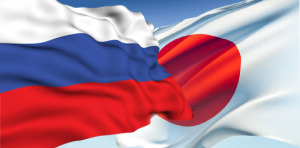
In what way can Japanese diplomacy satisfy these claims? On the one hand, this could take place during open formal negotiations, and on the other hand, as a result of some kind of backroom deal. We’ll look at both variants.
Let’s evaluate the “conspiratorial” approach to solving the Kuril issue. In Japanese society and its government circles there is a certain inclination towards a corrupt solution. In the opinion of some “experts,” a large-scale bribe just needs to be given to Vladimir Putin and a secret agreement will be signed.
So wrote Nihon Keizai Shimbun in a publication from May 19 of this year. It said that “if you do not cultivate a relationship of trust, while skillfully juggling the concepts of ‘confidentiality’ and ‘benefits,’ a breakthrough on the issue of the ‘territories’ will not appear.” Meanwhile, according to the Carnegie Moscow Center’s Liliya Shevtsova, “in Japan, where the question of the ‘Northern Territories’ attracts attention at the state level, the substance of the negotiations is discussed on all levels in the media,” and therefore it would be difficult to maintain “confidentiality.”
We will not idealize the Russian government, but the signing of a backroom deal today can hardly provide inspiration to anyone, especially when set against President Vladimir Putin’s campaign to combat corruption at all levels of government. If this issue was not resolved with the Kremlin in such a manner in the 1990s, then it will not be resolved in this manner in foreseeable future.
Officially, President Vladimir Putin has expressed his readiness to settle the territorial issue between the Russian Federation and Japan. Obviously, this can only mean one thing – he is willing to make concessions on certain conditions. This is the Kremlin’s official position. Not everyone in Japan understands this and demands that almost an exact date and time of the transfer of all the islands be set, preferably as soon as the following Tuesday.
As Nihon Keizai Shimbun has pointed out, since Vladimir Putin became head of state, he has twice resolved territorial disputes – namely, with China and Norway. At high-level Russian-Chinese talks in 2004, when the ownership of disputed territories on the eastern border was discussed, he decided to split them roughly in half. In 2010, the Russian government decided to demarcate the border with Norway. On that occasion, it was decided to equally divide an approximately 175,000-square-kilometer area ofthe Arctic Ocean, which had been under dispute for over 40 years.
Both solutions produced mixed reactions in Russian society.
Nihon Keizai Shimbun’s “analysis” went further and suggested that “the foundation of Mr. Putin’s regime is not as solid as before. The level of his support is a little over 60 percent, therefore he cannot ignore the reaction of society in talks over the territories.”
There are some strange notions concerning “regimes” in the Japanese press. Such as that the “regime” does not need to concern itself with the reaction of society. Dictators prefer to hang those who are unsatisfied with their politics rather than take their opinions into consideration. If Vladimir Putin were a dictator and not a democratic leader, he would have simply sold the islands. That is exactly what Emperor Alexander II “The Liberator” did with Alaska in the 19th century.
Vladimir Putin officially declared that the resolution of the territorial dispute between Russia and Japan is possible (i.e., concessions are possible), but not in the format of “all or nothing,” but in the gamut of “something for something.” A necessary condition, but not the only condition, for meeting the Japanese demands lies in the development of economic cooperation. The Russian president has said that: “Economic cooperation is the best tool for resolving the territorial dispute.”
This referred to Japan’s participation in the development of the Russian Far East, i.e. the integration of the Japanese and Russian economies. Such integration would be very beneficial both for Japan, which would have access to the energy resources of Siberia and the Far East, and for the Russian Federation. The strengthening economic ties with a highly developed country, which the United States uses as an unsinkable aircraft carrier off the coast of Russia (and sometimes uses just to stir up disagreements between the country and Washington’s political and economic rivals, particularly with Russia and China), is not as bad as it may seem.
It is namely for this reason that some pro-American forces in Japanese society are afraid of widening economic ties with Russia. More precisely, not afraid even … rather, Uncle Sam forbids them from approaching this thin “red line.”
Energy cooperation between Russia and Japan can only contribute to the solution of territorial disputes. Indeed, this cooperation imposes certain obligations on Japan towards the Russian Federation. And who does this worry? It worries Washington.
Japan’s territorial claims on Russia are artificially fueled by American puppet masters and their Japanese marionettes. Why? Washington wants the Land of the Rising Sun’s unconditional dependence on the U.S. and deliberately hinders the normalization of Russian-Japanese relations.
Meanwhile, after the Fukushima incident, the Land of the Rising Sun’s establishment was faced with the problem of energy supplies for the nation, many of its corporations have moved their production to China, and the latter is also taking advantage of this fact to satisfy their territorial claims. All these situations are not making life easier for the Japanese government.
So maybe it is time for Japan to make the right choice in its relations with Russia – between its practical needs and this chimerical problem that has been fussed over for decades?
Konstantin Penzev, a writer, historian and columnist, exclusively for the online magazine “New Eastern Outlook”.